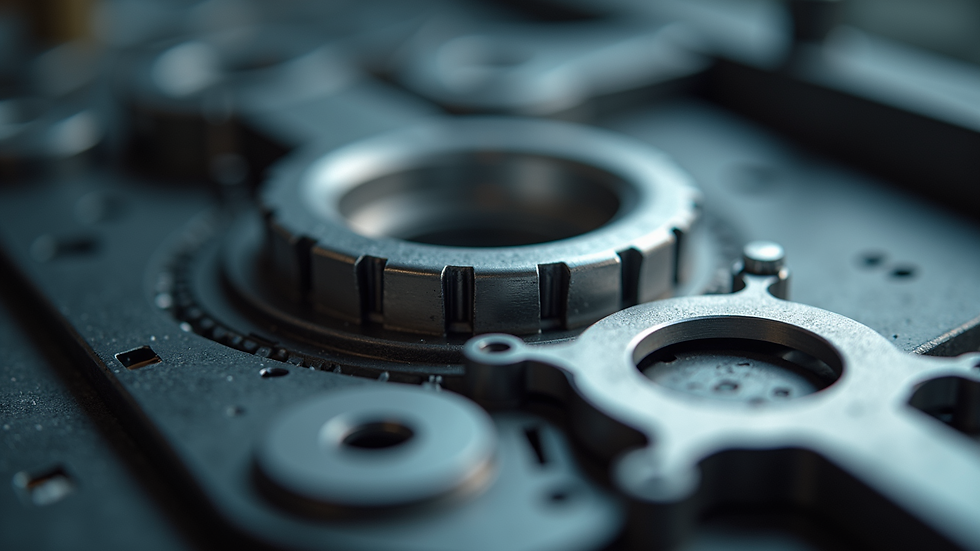The Role of Precision in Modern Die Manufacturing
- ericmoe1
- Sep 15, 2025
- 4 min read
In the world of manufacturing, precision is not just a goal - it is a necessity. Modern precision die manufacturing plays a crucial role in producing high-quality components that meet exact specifications. This process ensures that parts fit perfectly, function reliably, and maintain consistency across large production runs. Understanding the importance of precision in this field can help businesses improve product quality, reduce waste, and increase efficiency.
Why Precision Matters in Precision Die Manufacturing
Precision die manufacturing involves creating tools that shape or cut materials into specific forms. These dies must be crafted with extreme accuracy because even the smallest deviation can lead to defective parts. For example, in the automotive industry, a slight error in a die can cause engine components to malfunction, leading to costly recalls or safety issues.
The benefits of precision include:
Improved product quality: Accurate dies produce parts that meet tight tolerances.
Reduced material waste: Precise cuts minimize scrap and rework.
Enhanced production speed: Well-made dies reduce downtime and maintenance.
Consistency: Parts are uniform, which is critical for assembly and performance.
To achieve this level of precision, manufacturers use advanced technologies such as CNC machining, EDM (Electrical Discharge Machining), and 3D modeling. These tools allow for detailed design and exact execution.

Close-up view of a CNC machine cutting a metal die
Key Technologies Driving Precision Die Manufacturing
Modern precision die manufacturing relies heavily on technology to meet the demanding standards of various industries. Here are some of the key technologies that enable precision:
CNC Machining
Computer Numerical Control (CNC) machines use programmed instructions to control tools with high accuracy. This technology allows for complex shapes and fine details to be produced consistently. CNC machining reduces human error and speeds up production.
Electrical Discharge Machining (EDM)
EDM uses electrical sparks to erode material from a workpiece. It is especially useful for creating intricate shapes and hard materials that are difficult to machine with traditional methods. EDM provides excellent surface finishes and tight tolerances.
3D CAD Modeling and Simulation
Before manufacturing begins, engineers use 3D CAD software to design dies and simulate their performance. This step helps identify potential issues and optimize the design for better precision and durability.
Quality Control and Inspection Tools
Precision die manufacturing also depends on rigorous quality control. Tools like coordinate measuring machines (CMM) and laser scanners verify that dies meet specifications. These inspections prevent defects and ensure reliability.

Eye-level view of a technician inspecting a die with a coordinate measuring machine
Best Practices for Achieving Precision in Die Manufacturing
Achieving precision in die manufacturing requires more than just advanced technology. It also depends on skilled craftsmanship, proper planning, and continuous improvement. Here are some best practices:
Material Selection: Choose high-quality materials that can withstand wear and maintain shape.
Design Optimization: Use CAD software to refine die designs for manufacturability and performance.
Process Control: Maintain strict control over machining parameters and environmental conditions.
Regular Maintenance: Keep machines calibrated and dies maintained to prevent degradation.
Skilled Workforce: Train operators and engineers in the latest techniques and technologies.
Feedback Loop: Use data from inspections and production to improve future die designs.
By following these practices, manufacturers can ensure that their dies produce parts that meet or exceed customer expectations.
The Impact of Precision on Industry Applications
Precision die manufacturing affects many industries, including automotive, aerospace, electronics, and consumer goods. Each sector demands specific standards and tolerances, making precision critical.
Automotive: Precision dies produce engine parts, body panels, and safety components that must fit perfectly and perform reliably.
Aerospace: High precision is essential for parts that endure extreme conditions and require flawless performance.
Electronics: Tiny components require dies that can create intricate shapes with micron-level accuracy.
Consumer Goods: From appliances to packaging, precision dies ensure consistent quality and appearance.
The ability to produce precise dies directly influences product innovation, cost efficiency, and market competitiveness.

High angle view of aerospace components manufactured with precision dies
Embracing the Future of Precision Die Manufacturing
As technology advances, the future of precision die manufacturing looks promising. Innovations such as additive manufacturing (3D printing), artificial intelligence, and automation are set to enhance precision further.
Additive Manufacturing: Enables rapid prototyping and complex die geometries that were previously impossible.
Artificial Intelligence: AI can optimize machining processes and predict maintenance needs.
Automation: Automated systems improve consistency and reduce human error.
Manufacturers who adopt these technologies will gain a competitive edge by producing higher quality dies faster and at lower costs.
For businesses looking to improve their production capabilities, partnering with experts in die manufacturing can provide access to cutting-edge technology and skilled craftsmanship.
Enhancing Manufacturing Outcomes Through Precision
Precision in die manufacturing is more than a technical requirement - it is a strategic advantage. By focusing on accuracy, quality, and innovation, manufacturers can deliver superior products that meet the evolving demands of the market. Investing in precision not only reduces costs but also builds trust with customers and drives long-term success.



